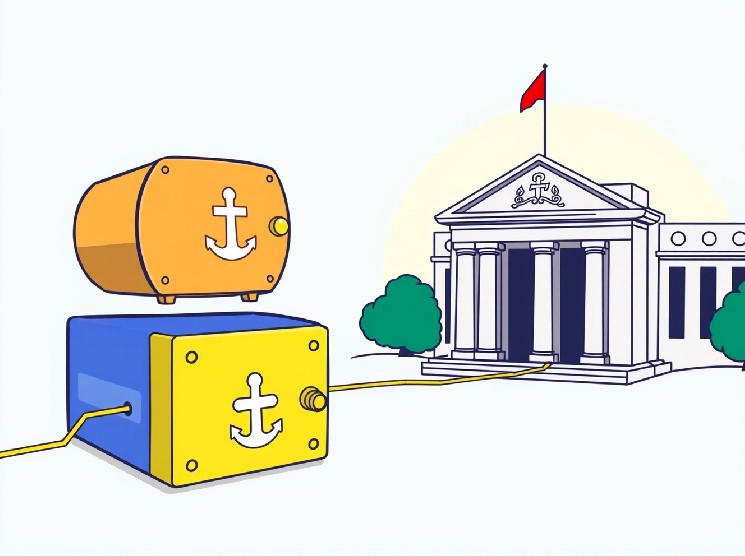In a significant development for the digital asset world, Anchorage Digital, a leading crypto custody and banking firm, has officially applied for a Federal Reserve master account. This move, recently highlighted by Eleanor Terrett of Crypto in America, marks a pivotal moment, potentially reshaping how cryptocurrency firms interact with the traditional U.S. financial system. For those keen on understanding the future of crypto banking, this application represents more than just paperwork; it signals a direct pathway to mainstream financial integration.
What Exactly is a Federal Reserve Master Account?
A Federal Reserve master account is essentially a direct gateway to the U.S. central bank’s payment infrastructure. Think of it as having your own direct line to the Fed, bypassing the need for an intermediary bank. Traditionally, financial institutions like commercial banks rely on these accounts to settle transactions, access liquidity, and participate in the broader financial ecosystem.
Without a master account, firms must partner with an existing commercial bank that already holds one. This adds layers of complexity, cost, and potential delays. For crypto companies, finding these banking partners has often been a significant hurdle due to regulatory uncertainties and risk aversion within traditional finance.
Why is This Application Pivotal for Anchorage Digital?
Anchorage Digital’s pursuit of a Federal Reserve master account is a game-changer for several reasons:
- Direct Access to Payment Systems: It grants Anchorage Digital direct access to vital payment rails like FedWire and FedACH. This means faster, more efficient, and potentially cheaper settlement of transactions.
- Reduced Counterparty Risk: By removing intermediary banks, Anchorage can significantly reduce counterparty risk. This is a huge benefit for institutional clients dealing with large volumes of digital assets.
- Enhanced Stability and Trust: Operating directly with the Fed could bolster Anchorage’s reputation as a stable and trustworthy financial institution in the eyes of regulators and traditional finance. It signals a deeper level of integration and oversight.
- Operational Efficiency: Streamlined operations, fewer administrative burdens, and greater control over their financial processes are all direct benefits.
This strategic step could position Anchorage Digital as a critical bridge between the burgeoning digital asset economy and the established financial world.
Broader Implications: Reshaping Crypto Banking and Beyond
The successful acquisition of a Federal Reserve master account by Anchorage Digital could send ripples throughout the entire crypto industry. It sets a precedent, demonstrating that crypto-native firms can achieve the same level of financial integration as traditional banks. This has several key implications:
- Increased Institutional Adoption: Direct access to Fed services could make digital asset services more appealing and accessible to large institutional investors and corporations who require robust, compliant financial infrastructure.
- Regulatory Clarity: While the application process itself is complex, a successful outcome could contribute to greater regulatory clarity for crypto firms seeking to operate within traditional financial frameworks.
- Competition and Innovation: It might encourage other qualified crypto firms to pursue similar master accounts, fostering greater competition and innovation in the digital asset banking sector.
- Lower Costs: Bypassing intermediaries could lead to lower transaction costs, which could ultimately benefit end-users and businesses leveraging digital assets.
This isn’t just about one company; it’s about validating the maturity and seriousness of the digital asset industry.
The Path Ahead: Challenges and Opportunities for a Federal Reserve Master Account
While the potential benefits are clear, obtaining a Federal Reserve master account is not a simple task. The application process is rigorous, involving extensive scrutiny of a firm’s financial health, risk management protocols, compliance frameworks, and operational resilience. The Fed evaluates applicants based on a comprehensive set of criteria, ensuring that any direct participant in its payment systems meets the highest standards.
For Anchorage Digital, navigating this path requires demonstrating:
- Robust Regulatory Compliance: Adherence to anti-money laundering (AML) and know-your-customer (KYC) regulations, as well as other banking laws.
- Sound Risk Management: Comprehensive strategies to manage operational, credit, and market risks associated with digital assets.
- Technological Security: Ironclad security measures to protect customer assets and maintain system integrity.
The outcome of this application will be closely watched, as it could indeed pave the way for a new era of crypto banking.
Anchorage Digital’s application for a Federal Reserve master account is a landmark event in the ongoing convergence of traditional finance and the digital asset economy. It represents a bold step towards integrating crypto firms directly into the core of the U.S. financial system, promising greater efficiency, reduced risk, and enhanced trust. While the journey is challenging, the potential rewards—for Anchorage Digital and the broader crypto industry—are immense, signaling a future where digital assets are seamlessly woven into the fabric of global finance.
Frequently Asked Questions (FAQs)
-
What is a Federal Reserve master account?
A Federal Reserve master account provides direct access to the U.S. central bank’s payment systems, allowing institutions to settle transactions and access liquidity without needing an intermediary bank. -
Why is Anchorage Digital applying for a master account?
Anchorage Digital seeks a master account to gain direct access to payment systems, reduce counterparty risk, enhance operational efficiency, and build greater trust and stability within the traditional financial system. -
How does a master account benefit the crypto industry?
It can increase institutional adoption of digital assets, contribute to greater regulatory clarity, foster competition among crypto banking services, and potentially lower transaction costs by removing intermediaries. -
Is it easy for a crypto firm to get a Federal Reserve master account?
No, the application process is highly rigorous. It involves extensive scrutiny of a firm’s financial health, risk management, compliance protocols, and operational resilience to ensure the highest standards are met. -
What happens if Anchorage Digital secures the master account?
If successful, Anchorage Digital would gain direct access to FedWire and FedACH, becoming a more integrated and stable player in the U.S. financial system, setting a precedent for other qualified crypto firms.
Did you find this deep dive into Anchorage Digital’s groundbreaking move insightful? with your network and join the conversation about the future of crypto banking!
To learn more about the latest crypto market trends, explore our article on key developments shaping digital assets institutional adoption.
Disclaimer: The information provided is not trading advice, Bitcoinworld.co.in holds no liability for any investments made based on the information provided on this page. We strongly recommend independent research and/or consultation with a qualified professional before making any investment decisions.



